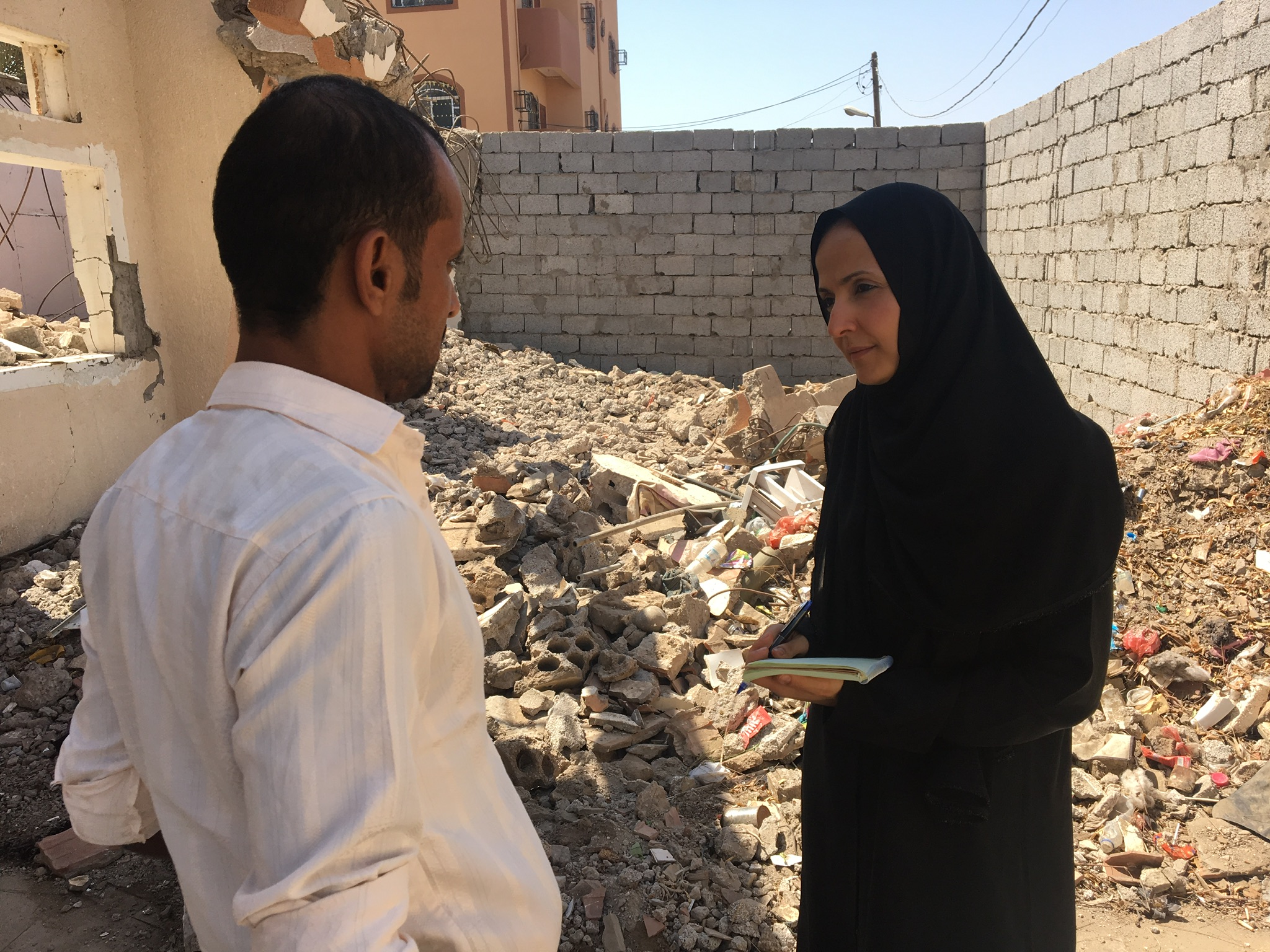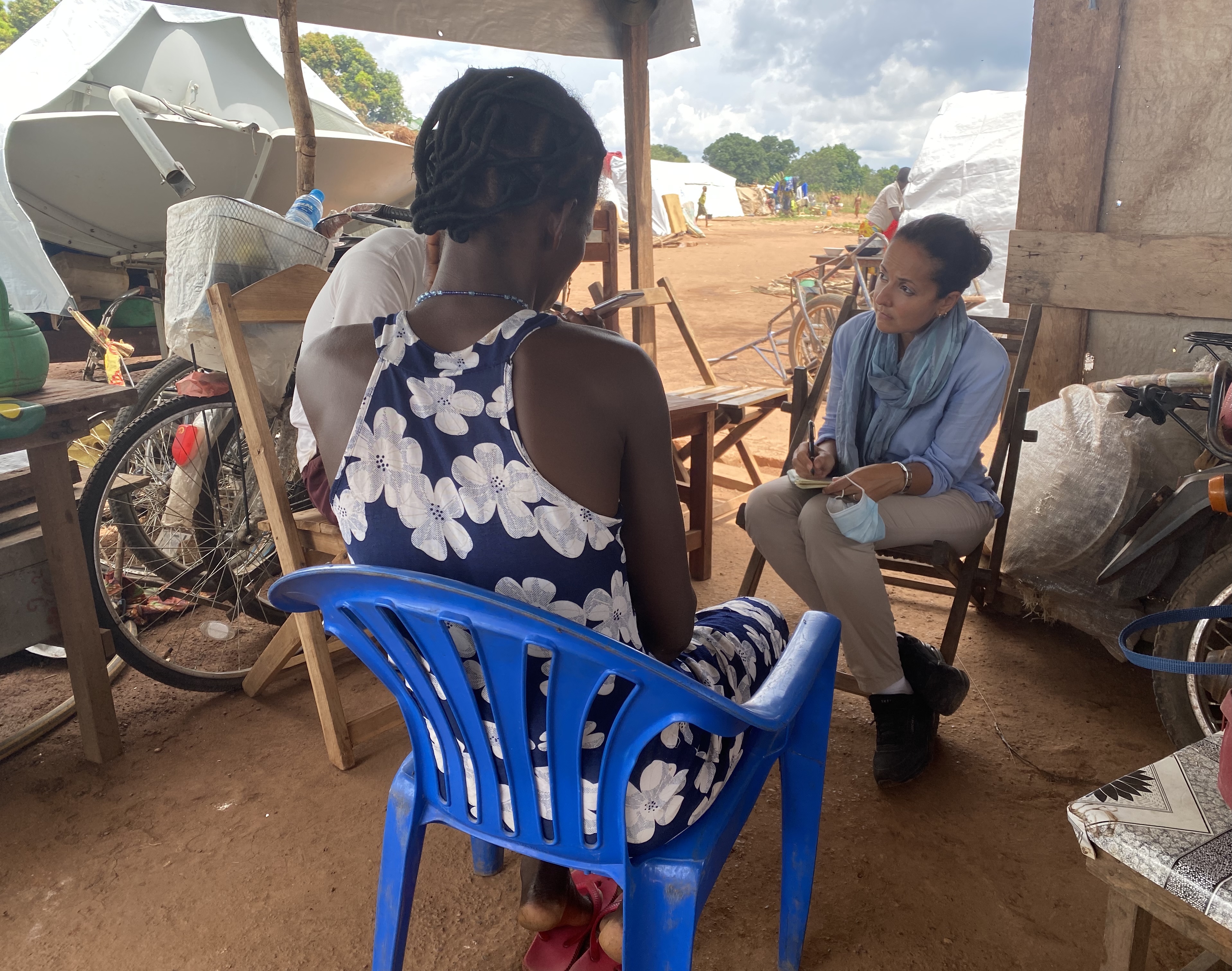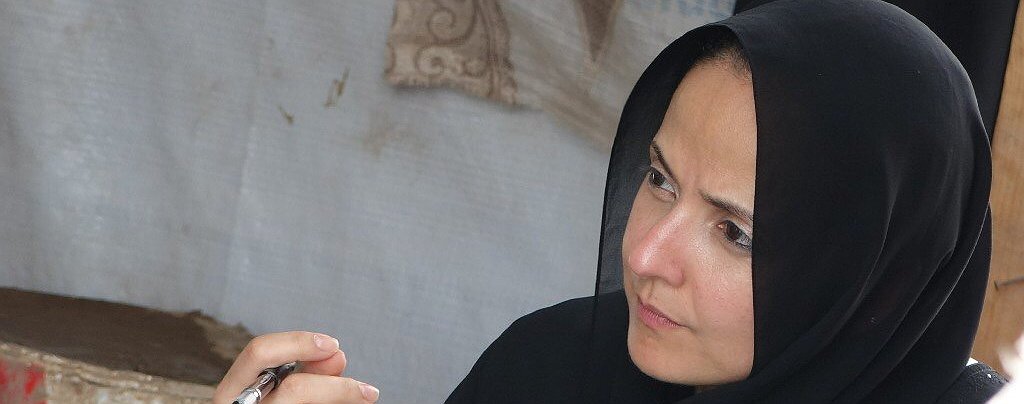After more than 15 years in journalism, covering major events from the Iraq war to the conflict in Darfur and the Arab Spring, Rawya Rageh joined Amnesty International as a Senior Crisis Adviser. While she had the right skill sets to research and write about human rights abuses, her reporting experience had not fully prepared her for the biggest task of all - interviewing hundreds of survivors of violence, and wading patiently and compassionately through their nonlinear accounts to establish patterns of abuse.
What made you shift from journalism to human rights advocacy?
There wasn’t a deliberate desire to shift careers, but there were a lot of transitions in my life at the time. I had moved to the US with my family and didn’t find a job in journalism that aligned with the type of journalism that I did for the Associated Press and Al Jazeera English. When I came across this job, I felt that it ticked all the boxes. I investigate and document human rights abuses in crisis and in armed conflict, including potential war crimes. In essence, it’s very similar to investigative journalism, but the work has to be rooted in international law, and the reports are followed by advocacy with governments and other entities, including parties to those conflicts.
Talk us through your daily tasks and your geographical focus…
My remit is investigating war crimes and egregious abuses in crises, so I don’t have a particular geographic focus. So far, I’ve worked on reports documenting violations in the Philippines, Syria, Yemen, the US, South Sudan, Sierra Leone, and Myanmar. I work with Amnesty International’s Crisis Team, which includes researchers with long experience in hostile environments as well as experts on remote sensing and satellite imagery, photo and video verification, and weapons and munitions identification.
We should not let the deadline pressure detract from the humanity by which we need to honour the stories of the survivors.
In the Philippines, for example, we investigated the so-called “war on drugs” where the government has been leading a policy of fighting drugs in such a heavy-handed way that it resulted in widespread and systematic extrajudicial executions. In the early months of that campaign, up to 1000 people were killed a month by the police and unknown armed assailants. So I travelled to the country alongside another colleague and interviewed families of the victims, witnesses, local government officials, lawyers and human rights defenders among others.
After a report is released, we typically undertake advocacy meetings with people who are either involved in these violations or have the power to influence the behaviour of those involved.
It may sound similar to what journalists do in a news organisation - minus the advocacy - but there are other aspects to the process. In Yemen, for example, we’re not just documenting violations by all parties to the conflict, but we’re also looking at the weapons and munitions being used and where they’re coming from, such as the United Kingdom and the US. We try to identify those weapons, and we track them down to the manufacturers and countries involved in these arms sales and we let them know that they are, in effect, involved in potential war crimes and violations, in addition to having the ability to influence the actions of parties in this conflict.

Was there anything that you weren’t prepared for when you moved to this job, or things you thought you should’ve known as a journalist?
I did assume that I would settle easily into the job because it requires the same skills as journalism. But then it dawned on me that the work takes much longer. I worked in newsrooms where everything happens very fast. But here, we interview a significantly higher number of people, and there’s a rigorous review and quality assurance that happens. Our reports are reviewed by several editors, including subject matter experts, lawyers and policy experts. What we write has to be rooted in international law.
I had to pace myself and realised that this job is a marathon, not a sprint. The psychological impact is also different. In journalism, there’s that instant gratification that comes from publishing an article - this ‘high’ we feel as journalists. But Amnesty’s investigations take a longer time to come out, so you don’t see the fruits of your labour for quite some time.
Also, how we define “impact” is different. With journalism, you want to inform the public. You may also want to influence policy but you’re not presenting recommendations and specific steps in the way you do with a human rights investigation.
Then, of course, there’s the amount of interviews it takes to produce the work. The bulk nature of the documentation in investigations is huge because you’re trying to establish patterns of violations, so, at times, we’re interviewing over a hundred survivors and witnesses, for example, and that does have its own weight.
Interviewing victims was only a part of what you did as a journalist, whereas now it is the majority of what you do. So are these interviews different? Do you approach survivors of conflict differently as a researcher than you did as a journalist?
Theoretically, the interviews shouldn’t be different, but realistically they are. In the final years of my career as a journalist, I noticed that newsrooms were simply not prepared to support or train journalists on interviewing survivors of violence. I had two degrees in journalism, and this simply isn’t taught in schools. Speaking with survivors requires some level of training. This may be changing now, and there are great initiatives and resource centres now such as the DART Center for Journalism and Trauma at the Columbia Graduate School of Journalism, and I would highly recommend that our members follow them and benefit from any training and resources they provide on interviewing survivors of trauma.
I have found that people do want to share their story, and if you are a compassionate and decent human being - people will want to talk.
At Amnesty International, the primary principle is to do no harm to the interviewees. So there is a detailed informed consent process that we undertake at the onset of our interviews, and it could take 15-25 minutes before the actual interview begins. I would explain to the interviewee, in as much detail as I can, who I am, what I’m doing, how this information will be used and where it will be published. Then I walk the interviewee through the possible impact this interview would have on them when and how the story comes out.
We also discuss the level of confidentiality; do they want to use their name or not, what details to keep and what to take out in order to protect their identity.
We also tell them they are free to end the interview anytime they want. They can tell me if they want a break at any time. Throughout the interview, we ask them repeatedly if they wish to continue. We reiterate that they do not have to answer any questions that make them uncomfortable. These are the specific sets of parameters that I lay out at the beginning of the interview which I never did as a journalist because nobody told me to do them. They weren’t part of the process.
As journalists, we tend to put down the microphone and just start talking to people. Of course you do ask if they are speaking on the record or request anonymity, but this detailed process isn’t there.
Why do you think this level of care and awareness doesn’t always happen in journalism?
In all fairness, journalists work under a lot of pressure and they need to get the story under tight deadlines. So let’s not be too harsh on journalists and newsrooms. But that being said, we should not let the deadline pressure detract from the humanity by which we need to honour the stories of the survivors.
It’s important to truly understand what happens to trauma survivors. At the heart of it, they were disempowered through that trauma. Their agency over their body and/or a particular moment of their lives was taken. The least you can offer them is not to be part of the continuation of undermining that agency. You need to give them that control over their story, over how they want to say it. So you have to involve them, including letting them choose where they want to do the interview, and who they want to be present.

What about the possibility of triggering or re-traumatising the interviewee when they recount what happened to them? Has any such thing ever happened while you were doing an interview, and how did you deal with it?
I remember as a journalist interviewing people who would suddenly stop and cry and you always wonder what would you do at that moment. It’s not an easy thing to remind someone of the worst moments of their lives. To be honest, in my experience both as a journalist and human rights investigator, I have found that people do want to share their story, and if you are a compassionate and decent human being who shows up to listen - and I would put several underlines on the word “listen” - people will want to talk.
One thing you do to mitigate this is to think very carefully about your questions in advance. Do you really need to ask a specific question? What value will it add to your report? Are you asking it because you just want a punchy quote, or will it provide important information?
You should also understand how to process the answers. Do not expect a linear story from a survivor of conflict and trauma. Allow them to tell their stories in their own words, and after that you can do your follow-up questions. Do not interrogate or cross-examine. Do not make it sound like you’re questioning certain details because it is very rare that you will get a linear story or a story where the details all line up.
It is always good to have in your backpocket a list of resources or certain entities that you could refer them to if they need help. From basic physical health needs, to mental health and counselling resources. If you’re interviewing children, you need to take into consideration the place and the presence of a particular caregiver or someone they trust.
Even if you’re a journalist working under pressure, just take that moment to know the person you are interviewing, to learn a little bit more about them outside the confines of that very particular dark moment you really want to know about.
Finally, do not make trauma the singular focus of what you are asking about. Even if you’re a journalist working under pressure, just take that moment to know the person you are interviewing, to learn a little bit more about them outside the confines of that very particular dark moment you really want to know about. Know them as a person, ask about their life, and at the end try to bring them back to the present. It’s not always easy, it doesn’t always work, and it’s not like I’m always going to walk out of an interview leaving a smile on someone’s face. If people cry or break down, you must give them space. Let them take a moment to calm, hold that space for them.
Throughout your work with Amnesty International, is there a specific interview that lingers with you?
Not one interview, but one of the hardest reports that I’ve worked on for Amnesty was on the long-term impact of the 1991-2002 war in Sierra Leone, and the Ebola pandemic, on people’s mental health. I interviewed people many years after they were exposed to horrific experiences, and some of these interviews were really difficult, and I stopped and asked myself many times whether I was doing the right thing. Did I really need to revive these memories years after people had experienced them? It was, hands down, one of the most difficult pieces of research I had ever undertaken with Amnesty.
We launched the report in Freetown, under the title “They are forgetting about us”. I wasn’t there for the launch, but a colleague of mine told me survivors who attended the event told him they felt they were being seen and heard because every word in that report was a true expression of what happened to them. When I heard that, I literally felt as if someone had put their hand on my heart.
I’m saying this to remind our members that even though the process of the interview can be very difficult and you will ask yourself many times whether you’re doing the right thing, there are these moments when the stories are published, and people will feel seen and heard. Then you will really feel that you achieved something.
Many of our members have become journalists because they wanted to make a difference in their countries and communities. But do you feel that what you do now with Amnesty International is making a difference?
You cannot detract from the importance of journalism. It certainly has its role, and human rights investigations have their role. And at times they complement each other.
Do I feel like I’m making a difference? With human rights investigations, you have to be very clear-eyed. It is very difficult to see instantaneous impact. You’re playing the long game here. A lot of people ask me how I could continue working on Syria and not get frustrated. Syria is one of most documented conflicts, but when are we ever going to see Bashar Al Assad at the International Criminal Court? When are we ever going to see anyone being held to account for what’s happening there?
The reality is we cannot allow ourselves to be overtaken by that frustration. Are there moments when I’m frustrated? Absolutely! When I spend months trying to convince the UN Security Council not to stop cross-border aid that feeds millions of people in northwestern Syria, it can be very frustrating. But I have to go through this process to ensure that a vote in the Security Council is passed.
Accountability can be very slow. It takes years and years to ultimately see people stand trial but we owe it to the survivors. To this day, Syrian survivors are still talking to us, and as long as they continue telling their stories then the least we can do is continue to document and push for it.
